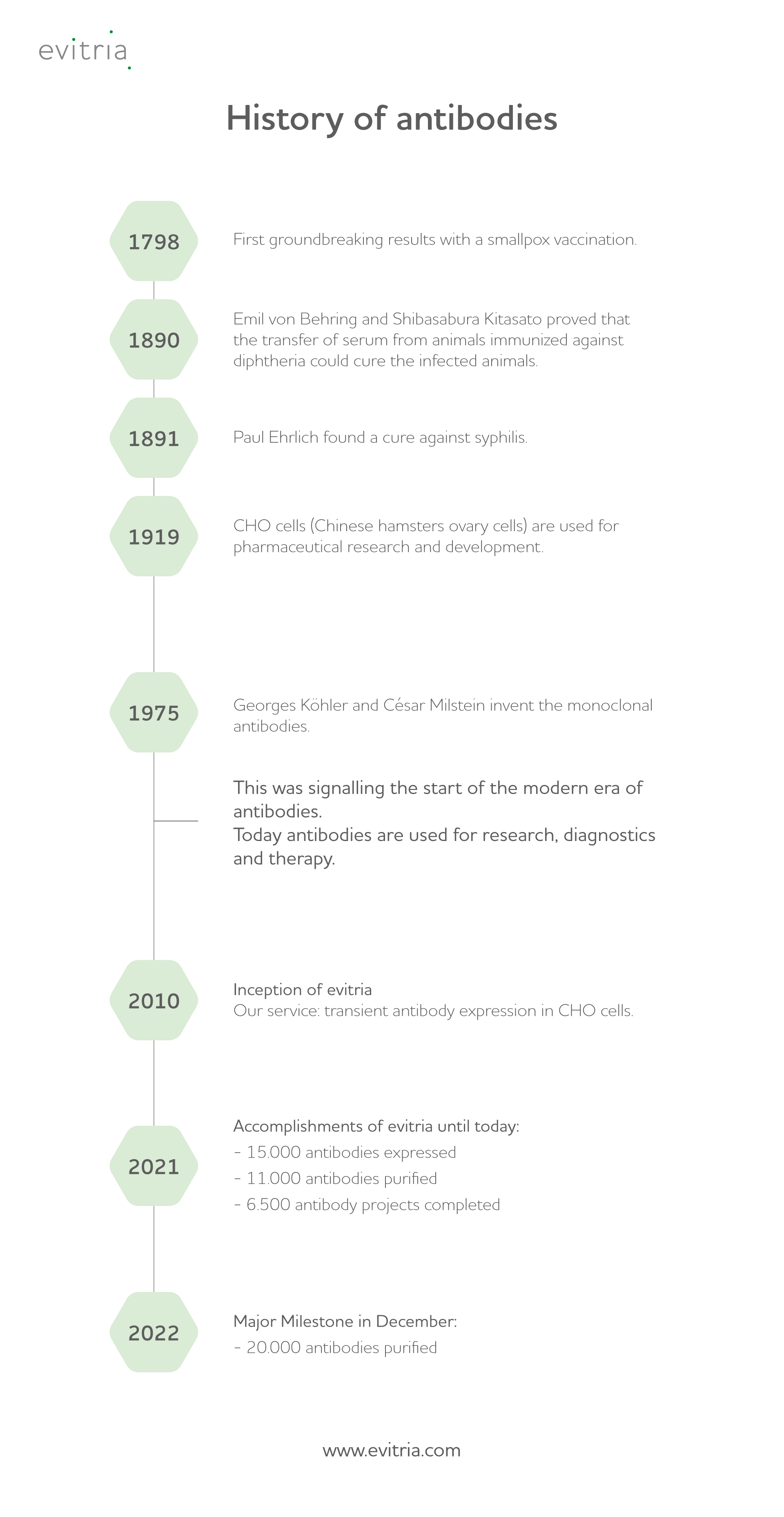The history of antibodies has gained a new chapter with the COVID-19 Pandemic. The term “monoclonal antibodies” became a buzzword for society in 2021. However, the history of antibodies, also known as immunoglobulin, reaches back far further than the early months of 2020 – their meaning and importance has not only started gaining relevance with the outbreak of COVID-19.
First groundbreaking results were achieved as early as the 18th century, in the quest to eradicate – or at least successfully contain – smallpox. From then on, many findings, such as the discovery of recombinant antibodies, could be achieved to unleash more of their huge potential. More currently, antibodies are being studied and used for novel therapies against deadly diseases such as cancer.
First experiences in the field were made in the years 1714 to 1717. At that time, Lady Mary Wortley Montagu, Emanuel Timoni and James Pylarini were working on a smallpox inoculation.
Antibodies are pivotal in the acquisition of immunity to a disease that a patient has already encountered, a fact that has been known and documented for centuries. Until today, this knowledge forms the basis for extensive research and a medical specialized field commonly known as immunology.
Subscribe to our Newsletter
Get all the latest updates, and learn about our advancements in antibody production.
Subscribe now
The term itself, which derives from the German “Antikörper”, was first coined in 1891 by Paul Ehrlich, a German Jewish physician and scientist who most notably found a cure against syphilis and who, together with Elie Metchnikoff, was awarded the Nobel Prize in 1908 for their work and insights into immunological defense.
However, it was referenced prior to that, namely in 1890, when Emil von Behring, a German physiologist, and Shibasabura Kitasato, a Japanese physicist, proved that the transfer of serum from animals immunized against diphtheria to animals suffering from it could cure the infected animals.

The modern era of antibody research began with the invention of monoclonal antibodies by Georges Köhler and César Milstein in 1975.
Today, antibodies are used for a number of applications in various medical and pharmaceutical fields such as research, diagnostics, and therapy. Researchers are inventing new cures for cancer or vaccines for viral diseases, such as against COVID-19.
While polyclonal antibodies are made using several immune cells and are widely used in research and diagnostics, monoclonal antibodies are the result of using identical immune cells that are all clones of a specific parent cell.
Read more: What are polyclonal antibodies? | Steps in antibody production
Due to their ability to target almost any cell surface or secreted molecule with remarkable efficacy and safety, antibodies offer unparalleled opportunities in the development of efficient drugs and therapies targeting a variety of diseases and illnesses.
Antibodies are Y-shaped proteins produced by the human body to identify and neutralize foreign objects, more specifically viruses.
The human body’s immune system produces five types of antibodies, each of which has distinct methods of fighting disease and infection by identifying harmful infectious organisms due to their antigens.
While there are “only” five types of antibodies, each antibody can produce an infinite number of different binding sites that match specific antigens.
In addition, antibodies can be divided into monoclonal antibody and polyclonal antibody types, most of which are artificially manufactured and manipulated to be used in different therapeutics. Just like their natural counterparts they are used to fight certain viruses in the human body.
Recombinant antibodies (rAbs) are monoclonal antibodies that are generated in vitro using synthetic genes. They have a number of advantages in both medical and research applications and are used for the diagnosis of different toxins or pathogens.
In the past decade, several antibodies have been developed for therapeutic applications, primarily targeting tumor, inflammatory or immune diseases such as Crohn’s disease, psoriasis and various types of arthritis.
Afucosylated antibodies on the other hand are engineered monoclonal antibodies with the oligosaccharides in the antibody’s Fc region missing fucose sugar units. This type of antibody increases the antibody-dependent cellular cytotoxicity (ADCC antibody).
ADCC is important regarding the efficacy of cancer antibodies, however, due to nonspecific IgG competing with the drugs for binding to FcγIIIa on natural killer cells, many approved cancer antibodies have less ADCC than could be desired. Afucosylated monoclonal antibodies overcome this problem through improved FcγIIIa binding.
In today’s pharmaceutical and medical sector, antibody production and design plays a crucial role, to increase the activity, extend the half-life, reduce the immunogenicity or increase the functionality of an antibody.
evitria scientists have extensive expertise in antibody design and custom recombinant antibody. evitria offers recombinant antibody production service including afucosylated antibodies and any other protein for their customers. All projects are completed in a minimum of time and fulfill the highest quality standards in this industry.
One of the most recent additions to evitria’s portfolio is mAbsolve’s STR technology. Fc-silenced antibodies demonstrate reduced Fc-effector functions (such as cytokine release) in vivo, which is advantageous for therapeutic applications where activation of the host’s immune system would have negative effects.